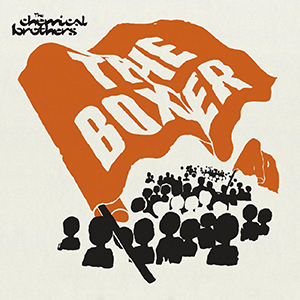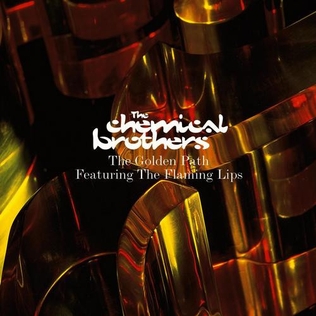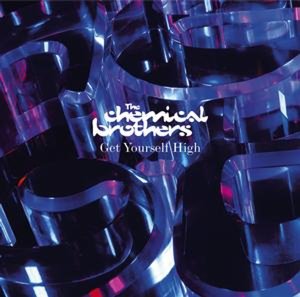
The Chemical Brothers are an English electronic music duo formed by Tom Rowlands and Ed Simons in Manchester in 1989. Alongside fellow English acts The Prodigy and Fatboy Slim, as well as American duo The Crystal Method, they were pioneers in bringing the big beat genre to the forefront of pop culture.

"Under Pressure" is a song by the British rock band Queen and singer David Bowie. Originally released as a single in October 1981, it was later included on Queen's 1982 album Hot Space. The song reached number one on the UK Singles Chart, becoming Queen's second number-one hit in their home country and Bowie's third, and also charted in the top 10 in more than 10 countries around the world.

Morcheeba is an English electronic band formed in the mid-1990s with founding members vocalist Skye Edwards and the brothers Paul and Ross Godfrey. They mix influences from trip hop, rock, folk rock and downtempo, and have produced ten regular studio albums since 1995, two of which reached the UK top ten. Edwards left the band in 2003, after which the brothers used a number of singers before she rejoined in 2009. They recruit additional members for their live performances and have toured internationally. In 2014 Paul Godfrey resigned from the band. Edwards and Ross Godfrey later formed Skye & Ross and released a self-titled album in September 2016. Their latest studio album as Morcheeba, Blackest Blue, was released in May 2021 and was preceded by singles "Sounds of Blue", "Oh Oh Yeah" and "The Moon". It features collaborations with Brad Barr from The Barr Brothers, and Duke Garwood, whom Edwards described as "a diamond geezer".

Dead or Alive were an English pop band that released seven studio albums from 1984 to 2000. The band formed in 1980 in Liverpool and found success in the mid-1980s, releasing seven singles that made the UK top 40 and three albums on the UK top 30. At the peak of their success, the lineup consisted of Pete Burns (vocals), Steve Coy (drums), Mike Percy (bass) and Tim Lever (keyboards), with the core pair of Burns and Coy writing and producing for the remainder of the band's career due to Percy and Lever exiting the group in 1989.

Exit Planet Dust is the debut studio album by English electronic music duo the Chemical Brothers. It was first released on 26 June 1995 in the United Kingdom by Junior Boy's Own, Freestyle Dust, and Virgin Records, and on 15 August 1995 in the United States by Astralwerks. The album was recorded between August and November 1994, with "Song to the Siren" performed live. Its title is a reference to their departure from their earlier name the Dust Brothers.

Dig Your Own Hole is the second studio album by the English electronic music duo the Chemical Brothers. It was released on 7 April 1997 in the United Kingdom by Freestyle Dust and Virgin Records and in the United States by Astralwerks. It was recorded between 1995 and 1997, and features Noel Gallagher of Oasis and Beth Orton as guest vocalists.

Come with Us is the fourth studio album by English electronic music duo the Chemical Brothers, released in January 2002 by record labels Virgin and Freestyle Dust in the UK and Astralwerks and Ultra in the US. It features Richard Ashcroft and Beth Orton as guest vocalists.

"In Bloom" is a song by American rock band Nirvana, written by vocalist and guitarist Kurt Cobain. It appears as the second track on the band's second album, Nevermind, released by DGC Records in September 1991.

Singles 93–03 is a compilation album by English electronic music duo The Chemical Brothers, released on 22 September 2003. It is a collection of singles from the duo between 1993 and 2003, plus two new songs "Get Yourself High" and "The Golden Path". Early copies of the CD came with a bonus CD. It was certified gold by the BPI on 24 October 2003.

"The Boxer" is a song recorded by English electronic music duo the Chemical Brothers for their fifth studio album Push the Button (2005). It served as the album's third single in the United Kingdom and Europe, released by Virgin Records and Freestyle Dust, and as the second single in the United States via Astralwerks. The song is a psychedelic pop track which features The Charlatans' lead singer Tim Burgess on vocals and as a co-writer. This is the second collaboration between Burgess and the duo, following "Life is Sweet", which was released 10 years earlier.

"The Golden Path" is a song recorded by English electronic music duo the Chemical Brothers, taken from their first greatest hits album, Singles 93–03. Featuring the Flaming Lips, the lead vocals were performed by Wayne Coyne with Steven Drozd performing backing vocals. The song reached number 10 in Spain, number 17 in the United Kingdom, number 20 in Ireland, and number 32 in Italy.

"Get Yourself High" is a 2003 single by The Chemical Brothers. It features Canadian rapper k-os and appeared as a bonus track on their collection Singles 93–03. A music video featuring footage from a martial arts film accompanied the song. The song was nominated for a Grammy Award for Best Dance Recording, but lost to "Toxic" by Britney Spears.

"Star Guitar" is a song by English electronic music duo the Chemical Brothers, released as the second single from their fourth album, Come with Us (2002). It reached number eight on the UK Singles Chart, number two on the US Billboard Dance Club Play chart, and number one on the UK Dance Chart. The song was greeted with praise from critics, and makes an appearance in the 2007 comedy Smiley Face.

The Hits & Beyond is the second greatest hits album by Australian singer-songwriter Dannii Minogue. It was released by All Around the World Records on 16 June 2006 in Ireland and the United Kingdom on 19 June 2006. The album was then released by Central Station Records in New Zealand on 4 August 2006 and Australia on 7 August 2006.

"Block Rockin' Beats" is a song by British big beat duo the Chemical Brothers. Released in March 1997 as the second single and opening track from their second studio album, Dig Your Own Hole (1997), it topped the UK Singles Chart and peaked at number 40 on the US Billboard Modern Rock Tracks chart. It received a Grammy Award for Best Rock Instrumental Performance.

"It Began in Afrika" is a song by British electronic music duo the Chemical Brothers. It was released as the first single from their fourth album Come with Us on 10 September 2001. Originally named "Electronic Battle Weapon 5" and released for DJs as a white label in June 2001, "It Began in Afrika" became a hit in clubs and was renamed for its official release. The song contains vocal samples from the track "Drumbeat" by American musician Jim Ingram, who was given a writing credit.

Brotherhood is a compilation album by English electronic dance music duo The Chemical Brothers, released on 1 September 2008. It is the second compilation spanning the band's greatest hits, after 2003's Singles 93–03. The first disc features thirteen hit singles and two new tracks, "Midnight Madness" and "Keep My Composure" —while the second CD contains all ten parts of The Chemical Brothers' "Electronic Battle Weapon" series of special mixes, which the duo have been recording since 1996.
Big beat is an electronic music genre that usually uses heavy breakbeats and synthesizer-generated loops and patterns – common to acid house/techno. The term has been used by the British music industry to describe music by artists such as The Prodigy, the Chemical Brothers, Fatboy Slim, the Crystal Method, Propellerheads, Basement Jaxx and Groove Armada.

"Parisienne Walkways" is a song by guitarist Gary Moore that reached number 8 in the UK Singles Chart in May 1979. The song is featured on Moore's album Back on the Streets and features a vocal from Thin Lizzy frontman, Phil Lynott, who co-wrote the song with Moore. Lynott also played bass guitar on the track, alongside Thin Lizzy drummer Brian Downey, thus reuniting the short-lived 1974 Thin Lizzy line-up which had recorded "Still in Love with You", "Sitamoia" and the single "Little Darling". The melody of "Parisienne Walkways" is based on the jazz standard "Blue Bossa" by Kenny Dorham. It became Gary Moore's signature song.

"Willie and the Hand Jive" is a song written by Johnny Otis and originally released as a single in 1958 by Otis, reaching #9 on the Billboard Hot 100 chart and #5 on the Billboard R&B chart. The song has a Bo Diddley beat and was partly inspired by the music sung by a chain gang Otis heard while he was touring. The lyrics are about a man who became famous for doing a dance with his hands, but the song has been accused of glorifying masturbation, though Otis always denied it. It has since been covered by numerous artists, including The Crickets, The Strangeloves, Eric Clapton, Cliff Richard, Kim Carnes, George Thorogood and The Grateful Dead. Clapton's 1974 version was released as a single and reached the Billboard Hot 100, peaking at No. 26. Thorogood's 1985 version reached No. 25 on the Billboard Rock Tracks chart.



















